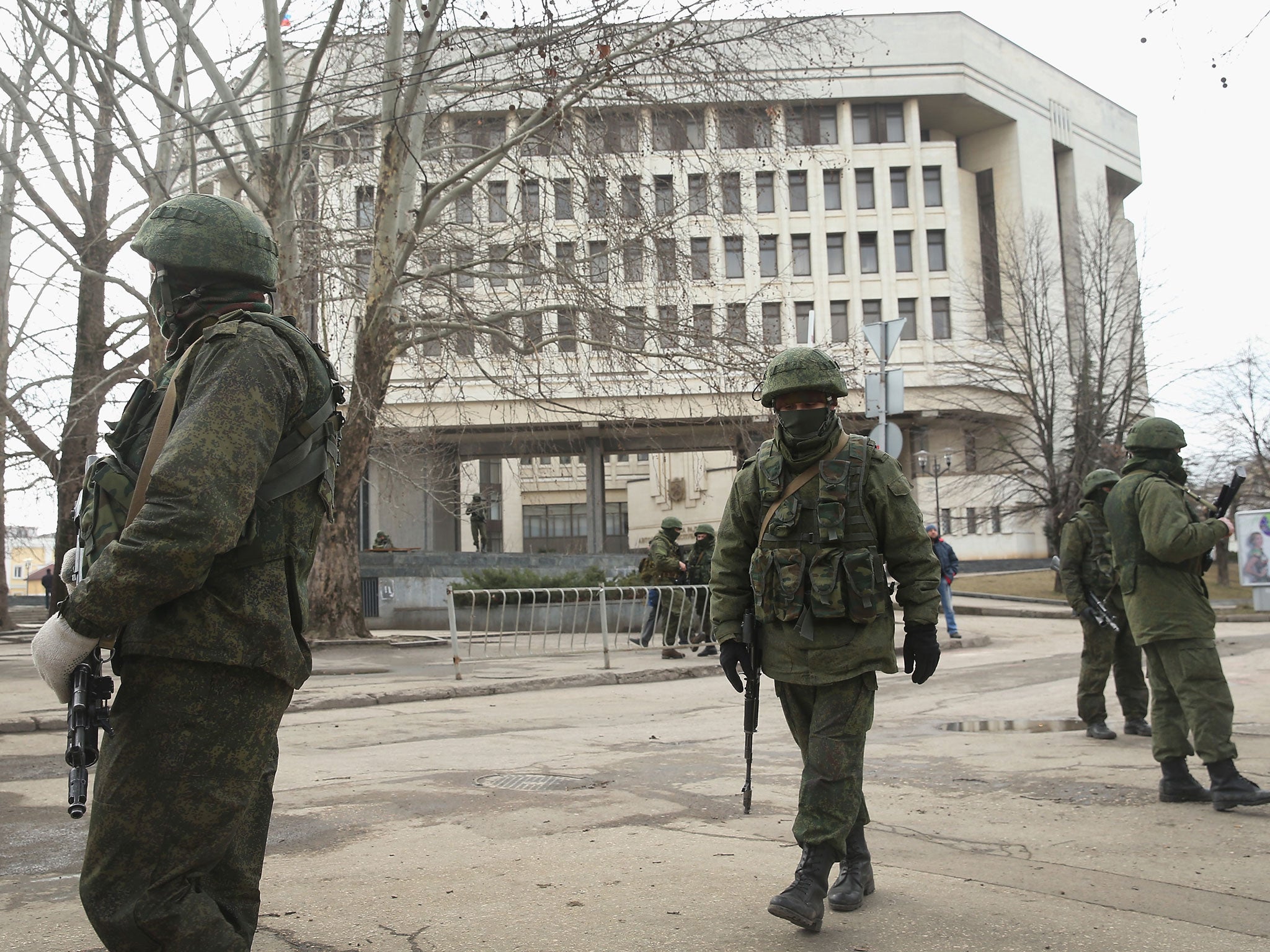UN Security Council calls emergency meeting after Russian show of force as way cleared for Crimea invasion
Vladimir Putin says soldiers needed against 'the threat to the lives of citizens of the Russian Federation'

The UN Security Council is holding an emergency meeting today after the Russian parliament gave president Vladimir Putin the go-ahead to send troops into Crimea following unrest in Ukraine.
The meeting has been organised at the request of the UK, according to a diplomat from Luxembourg.
Earlier today, the Russian parliament has belatedly approved the deployment of troops in Ukraine following claims that 6,000 soldiers have moved into Crimea.
Military helicopters and armed convoys were reported in the region on Friday but there was silence from Russia until Saturday afternoon, when President Vladimir Putin made a formal request to parliament.
“In connection with the extraordinary situation in Ukraine, the threat to the lives of citizens of the Russian Federation, our compatriots, and the personnel of the armed forces of the Russian Federation on Ukrainian territory," he said.
"I submit a proposal on using the armed forces of the Russian Federation on the territory of Ukraine until the normalisation of the socio-political situation in the country.”
Members voted unanimously to formalise the manoeuvre, which also raised the possibility that Moscow could send troops beyond Crimea.
In the same session, they recalled Russia’s ambassador to the US in the wake of Barack Obama’s warning to Mr Putin that any military intervention in Ukraine’s political crisis would carry “costs”.
“It would present a profound interference in matters that must be decided by the Ukrainian people,” he said.
In pictures: Russian troops in Crimea as Ukraine crisis continues
Show all 10The West expressed alarm over the fast-moving developments, urging all sides to avoid further escalation and calling on Russia to respect Ukraine's sovereignty.
France, Britain and Germany issued calls for de-escalation in Crimea hours after US President Barack Obama warned that military intervention in the region would be deeply destabilising and "carry costs".
"France is extremely concerned by the reports from Crimea, which describe significant troop movements," French Foreign Minister Laurent Fabius said in a statement.
"We call on the parties to abstain from acts that could raise tensions and affect Ukraine's territorial unity."
In a statement, French President Francois Hollande urged European countries to take swift and decisive action to find a way out of the crisis in Crimea when their foreign ministers meet in Brussels on Monday.
"Everything must be done to avoid outside intervention and the risk of a highly dangerous escalation," Hollande's office said in a statement.
Hollande had spoken to Polish Prime Minister Donald Tusk and both expressed alarm over situation, which the statement said posed a "real threat to Ukraine's territorial unity and sovereignty".
British Foreign Secretary William Hague, who travels to Ukraine on Sunday to hold talks with the new leadership, urged his Russian counterpart to act to ease tensions and said Russia was posing a potentially grave threat to Ukraine.
Hague said Britain supported the Ukrainian government's request for urgent consultations in accordance with the 1994 Budapest Memorandum, signed by Britain, United States, Russia and Ukraine.
The memorandum provided guarantees of Ukraine's sovereignty and integrity in exchange for a Ukrainian commitment, since fulfilled, to give up its Soviet-era nuclear weapons.
Prime Minister David Cameron said Britain had called an emergency meeting of the United Nations Security Council in view of the "serious and concerning events" in Ukraine.
"There can be no excuse for outside military intervention in Ukraine - a point I made to President Putin when we spoke yesterday," Cameron said.
"Everyone must think carefully about their actions and work to lower, not escalate tension. The world is watching."
German Foreign Minister Frank-Walter Steinmeier called developments in Crimea over the past few hours dangerous and urged Russia to explain its intentions.
"The situation in Crimea in particular has become considerably more acute. Whoever pours more oil onto the flames now, with words or actions, is consciously aiming for further escalation of the situation," he said.
"Everything Russia does in Crimea must be in keeping with the sovereignty and territorial integrity of Ukraine, and treaties on Russia's Black Sea fleet."
Steinmeier said European leaders must confer swiftly in order to agree a common position of the European Union.
The Ukrainian military are still on “high alert” after troops entered Crimea on Friday, taking control of airports and roads.
Crimean politician Sergei Aksyonov had earlier claimed he was in control of the area and declared that the armed forces, police, national security service and border guards will answer only to his orders.
Mr Aksyonov, who is head of the main pro-Russian party on the peninsula, had appealed to Russia “for assistance in guaranteeing peace and calmness on the territory of the autonomous republic of Crimea”.
The international airport at Simferopol, the regional capital, is closed and Ukrainian military sources said Russian servicemen also control military airfields in Belbek, near Sevastopol, and in Kirovskoye in eastern Crimea.
Pro-Russian demonstrations have broken out in the area and across eastern Ukraine, where protesters raised Russian flags and some attacked supporters of the new Ukrainian government.
Additional reporting by Reuters
Subscribe to Independent Premium to bookmark this article
Want to bookmark your favourite articles and stories to read or reference later? Start your Independent Premium subscription today.

Join our commenting forum
Join thought-provoking conversations, follow other Independent readers and see their replies